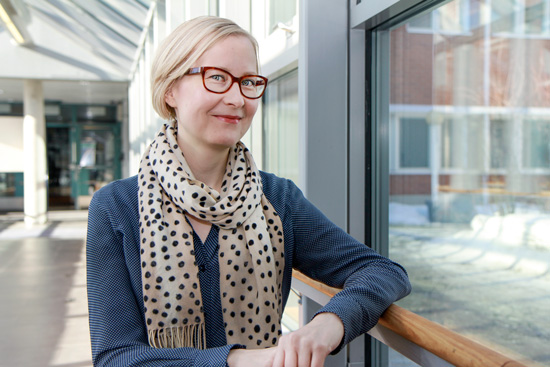The exercise of power over indigenous peoples has not decreased, even though they enjoy improved opportunities for political participation and increased recognition of their rights. Rather, power has taken on more subtle forms.
 Photo: Irma Varrio
Photo: Irma Varrio
This is among the insights which Marjo Lindroth puts forward in the research for her dissertation,
Governing Indigeneity Globally: Indigenous Peoples in the United Nations. Ms. Lindroth has found that the considerable progress seen in the recognition of indigenous peoples internationally does not signal that less power is being exercised over them. Her analysis of the improved participation and rights that have been embraced in the United Nations (UN) reveals that power and governance have continued in more subtle forms than previously. As she points out, “Measures that are often perceived as self-evidently desirable and empowering for indigenous peoples have effects of power that, in fact, continue the marginalisation of those peoples”.
Ms. Lindroth’s analysis illustrates how access for indigenous peoples to certain political institutions and recognition of their rights can be part of the economical functioning of governance. Measures such as these can thus also be desirable goals for states and other actors, meaning that states are not necessarily changing their attitude towards indigenous peoples in any profound way.
The empirical material which Ms. Lindroth draws on in her research encompasses her observations in the sessions of the UN Permanent Forum on Indigenous Issues, political statements delivered by the participants in the sessions and reports of the Special Rapporteur on the Rights of Indigenous Peoples.
A critical perspective on the recognition of rights
Marjo Lindroth’s research does not deny the importance of rights or political participation in the efforts to improve the situation of indigenous peoples. Clearly, the UN Permanent Forum on Indigenous Issues and the Declaration on the Rights of Indigenous Peoples are milestones in the advancement of the status of the peoples. Indigenous peoples have better possibilities for political participation and agency than previously.
In fact, given that indigenous peoples’ demands for self-determination have traditionally been problematic for states, the current international trend towards acknowledging the rights of indigenous peoples would seem to be a heartening development that will further enhance their status.
Many of the states that are now recognising indigenous rights are among those that have colonised those same peoples. Acknowledgement of indigenous rights and the inclusion of indigenous peoples in political institutions can be seen as a victory for the peoples, who have had to act in a challenging and even hostile environment.
Against this backdrop, Ms. Lindroth critically challenges the view that improved political participation and rights are necessarily solutions. She then goes on to address what she considers a more salient issue: How did participation and rights become desirable goals in the first place?
Information on the defence:
Marjo Lindroth’s doctoral dissertation,
Governing Indigeneity Globally: Indigenous Peoples in the United Nations, will be publicly examined in the Faculty of Social Sciences on Friday, 20 March at noon, in lecture hall 3, Yliopistonkatu 8, Rovaniemi. The Opponent will be Ole Jacob Sending, Director of Research at the Norwegian Institute of International Affairs, and the Custos Monica Tennberg, Research Professor in the Arctic Centre at the University of Lapland. Welcome!
Information on the doctoral candidate:
Marjo Lindroth (born 1976 in Rovaniemi) completed her matriculation examination at Lyseonpuisto Upper Secondary School in Rovaniemi in 1995. She graduated with a master’s degree in social sciences from the University of Lapland in 2001.
Ms. Lindroth has worked as a researcher in the LeCTra Doctoral Programme at the University of Lapland and in the Arktis Doctoral Programme at the Arctic Centre. She has also worked as a grant-funded researcher and in different projects at the Arctic Centre.
Currently she works as project coordinator for the journal
Barents Studies: Peoples, Economies and Politics.
Further information:
Marjo Lindroth
Tel. 040 762 3346
marjo.lindroth(at)ulapland.fi
Press copies of the dissertation are available from Lapland University Press, tel. 040 821 4242, julkaisu(at)ulapland.fi
Publication information:
Marjo Lindroth:
Governing Indigeneity Globally: Indigenous Peoples in the United Nations. Acta Universitatis Lapponiensis 293. ISBN 978-952-484-788-9. ISSN 0788-7604.
ULapland/Communications/RJ